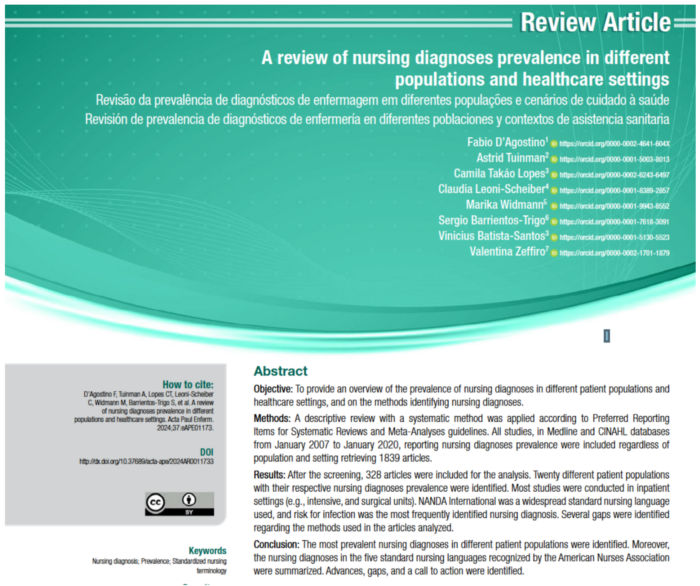A Review of Nursing Diagnoses Prevalence in Different Populations and Healthcare Settings

We recommend you read this recently published article, written by Fabio D’Agostino, Astrid Tuinman, Camila Takao Lopes, Claudia Leoni-Scheiber, Marika Widmann, Sergio Barrientos-Trigo, Vinicius Batista-Santos, and Valentina Zeffirto.
Here are our thoughts!
In this very important descriptive review article, conducted in accordance with the PRISMA guidelines, an international panel of nurse experts completed a massive analysis of 328 articles in twenty patient populations in which the prevalence of nursing diagnosis (ND) was identified. The majority of these articles were from an inpatient hospital setting, primarily in adult and elderly patients, and risk for infection (00004) was the most frequently identified nursing diagnosis.
The study looked at five standardized nursing languages (Omaha System, PNDS, NANDA-I, CCC, and ICNP). Three SNLs (Omaha System, PNDS, and NANDA-I) had high-frequency NDs that fell in the fifth quintile, while CCC and ICNP had no high-frequency ND. The NANDA-I had 68 high-frequency NDs, and five NDs were identified in more than 100 samples.
The authors noted, “It is important to note that apart from the NANDA-I Classification, the other SNLs either lack validation studies on the NDs or do not contain defining characteristics or signs and symptoms essential for accurately identifying an ND” (p. 11). Further, they indicate that additional reviews should be conducted “to investigate and update the epidemiology of NDs. Literature reviews like this one should be replicated every two to five years to provide feedback on the epidemiology of patient needs from a nursing perspective and on the use of the NDs to the nursing community; studies like these should be promoted within the SNL associations.”
We would add there is a need, as discussed by these authors, for studies in infants, children/adolescents, young adults, and socioeconomically disadvantaged populations.
NANDA-I congratulates these authors on this extensive piece of important work!
